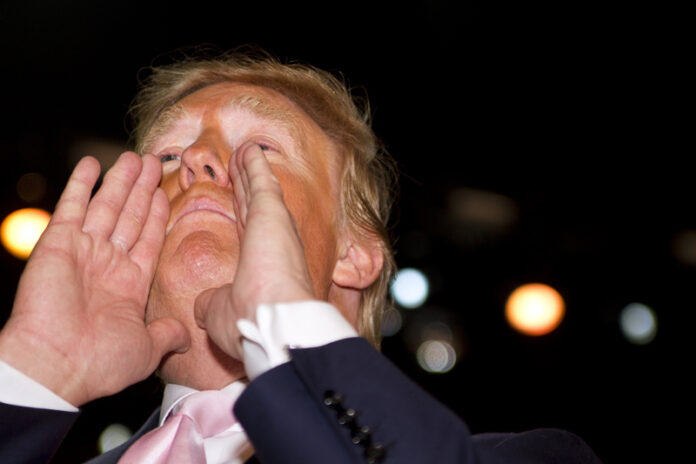When Australian Prime Minister Anthony Albanese arrived at the White House on Monday, October 20, 2025, for his first official meeting with President Donald Trump, he likely anticipated diplomatic protocol and measured exchanges. What he got instead was an unexpectedly blunt confrontation between Trump and Australia’s ambassador to the United States, Kevin Rudd, that left the room erupting in uncomfortable laughter.
The awkward exchange occurred during a Cabinet Room press conference when an Australian reporter asked Trump whether he had any concerns about Albanese’s administration, including Rudd’s past critical comments about the president. Trump initially responded that he knew nothing about Rudd, apparently unaware that the ambassador was present in the room. When Trump inquired whether Rudd still worked for the Australian government, the former prime minister acknowledged that his controversial social media posts were made before he assumed his diplomatic position.
Trump’s response was characteristically direct. “I don’t like you either, and I probably never will,” Trump told Rudd in front of assembled officials and journalists. The president’s unfiltered remark referenced social media posts Rudd published in 2020, before his March 2023 appointment as ambassador, in which he described Trump as the most destructive president in history and a traitor to the West. Another post labeled Trump a village idiot.
Rudd, who served as Australia’s prime minister between 2007 and 2010, and briefly again in 2013, had deleted the controversial tweets after accepting the ambassadorship. However, the posts resurfaced during the White House meeting, creating an uncomfortable moment during what was meant to be a celebration of strengthened bilateral ties. Sources indicated that minutes after his blunt comment, Trump reportedly told Rudd that all was forgiven, suggesting the president viewed the exchange as settled.
Despite the awkward confrontation, the meeting proceeded with the signing of a significant critical minerals agreement between the two nations. Albanese announced that the framework includes plans for projects worth up to $8.5 billion, representing a major strategic partnership aimed at reducing dependence on China for rare earth elements crucial to weapons platforms, semiconductor manufacturing, robotics, and electric vehicles.
The White House issued a fact sheet describing the agreement as a framework under which the countries would invest more than $3 billion in critical mineral projects over the next six months. The framework states the two governments will each commit at least US$1 billion, speed up permitting for mining and processing, and work to establish a minimum price-floor on defined critical minerals to counter non-market exports.
The Export-Import Bank of the United States will issue seven letters of interest for more than $2.2 billion in financing, potentially unlocking up to $5 billion in total investment. Albanese indicated there would be three groups of joint projects between the two countries, including participation from companies such as Alcoa.
The Pentagon will invest in building a gallium refinery in Western Australia with a capacity of 100 metric tons per year. Alcoa announced in August that it was exploring the feasibility of a gallium project with Japan at one of the company’s alumina refineries in Western Australia. Trump expressed optimism about the partnership, telling reporters that within a year, the United States would have abundant critical minerals and rare earths. The president emphasized that the administration was working with multiple nations to build supply chains independent of China.
The strategic timing of the agreement comes as China announced strict export controls on rare earths earlier this month, escalating tensions between Beijing and Washington. Trump has threatened 100 percent tariffs on Chinese goods starting on November 1 or sooner if China does not reverse its position. The president confirmed he would meet with Chinese President Xi Jinping in South Korea later in October and planned to visit China early next year.
Back in Australia, opposition leader Sussan Ley seized on Trump’s comments, arguing that Rudd’s position had become untenable and calling for his dismissal as ambassador. However, according to the Guardian, on October 22, she publicly walked back her call for his removal, saying that Rudd’s role remained important to bilateral ties.
Albanese forcefully rejected those demands, publicly defending Rudd at a Friends of Australia breakfast attended by Republican and Democratic members of Congress. The prime minister praised the ambassador’s work ethic and extensive connections on Capitol Hill, describing him as instrumental in negotiations over Aukus, the multibillion-dollar submarine deal between Australia, the United Kingdom, and the United States.
Republican Representative Michael McCaul supported Albanese’s assessment, joking that he was pleased Rudd remained gainfully employed while acknowledging the ambassador’s critical role in Aukus discussions. Albanese attributed the success of his two-day visit to Washington to Rudd’s efforts, publicly thanking the ambassador at an event commemorating the 140th anniversary of mining giant BHP. The prime minister characterized Trump’s earlier remarks as banter, attempting to downplay the significance of the president’s unusually direct criticism.
The Trump-Albanese meeting also addressed the ongoing review of America’s role in the Aukus pact, which remains under scrutiny as part of the administration’s America First agenda. The nuclear submarine agreement represents one of the most significant defense partnerships in the Indo-Pacific region, making its future a matter of considerable strategic importance for both nations.

